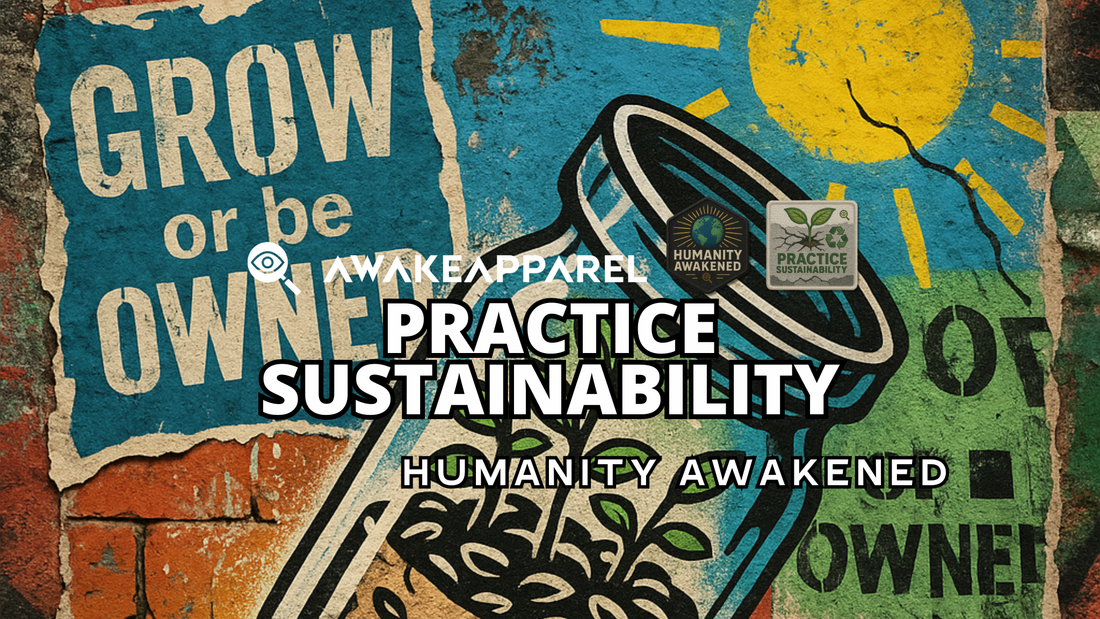
🔥 SPREAD THE TRUTH – Tap to Share!
PRACTICE SUSTAINABILITY
Reject the Greenwashing & Take Real Action
📂 Category: Humanity Awakened – The Blueprint for Real Change
🔹 Focus: 🌿 Regenerative Living
🪬 Feature: Practice Sustainability
📡 Truth Trigger: “They paved paradise—we’re replanting the garden.”
Sustainability has been hijacked.
Governments and corporations—the biggest polluters on the planet—have turned “sustainability” into a marketing scheme.
They impose carbon taxes, ban plastic straws, and guilt-trip citizens…
All while they pollute at industrial scale.
We see the scam.
Real sustainability isn’t a corporate buzzword—it’s breaking free from a system that exploits resources, manipulates consumers, and protects polluters.
But that doesn’t mean we get a free pass.
We can hold the elites accountable and make conscious choices that actually protect the Earth—without feeding the fake green narrative.
🚫 No more falling for PR stunts.
🚫 No more billion-dollar polluters preaching “eco values.”
🚫 No more guilt while they destroy the planet for profit.
✊ ![]() 🌍
🌍 ![]() ✊
✊ ![]() 🌍
🌍
This is real sustainability. Conscious. Intentional. Powerful.
🔥 How to Take Sustainability Back
♻️ 1. Reject Waste Culture
We live in a disposable economy built to keep us consuming—and landfills overflowing.
✅ Ditch the Single-Use Mindset – Avoid overpackaged, throwaway products.
✅ Compost What You Can – Turn food waste into nutrient-rich soil.
✅ Recycle with Intention – Learn what actually gets recycled in your area.
✊ ![]() 🌍
🌍 ![]() ✊
✊ ![]() 🌍
🌍
⚡ 2. Control Your Energy Use
Fossil fuel giants blame you for climate change—while raking in record profits.
✅ Upgrade Appliances – Energy-efficient tools = long-term savings.
✅ Unplug Vampire Devices – Stop wasting power on idle electronics.
✅ Go Solar When You Can – Every panel is one step closer to independence.
✊ ![]() 🌍
🌍 ![]() ✊
✊ ![]() 🌍
🌍
🌞 3. Support Real Renewables—Not Corporate Greenwashing
Not all “green energy” is clean. Some just rebranded the same exploitative systems.
✅ Choose genuine renewable providers.
✅ Install solar or explore off-grid options.
✅ Advocate for policies that prioritize people, not profits.
✊ ![]() 🌍
🌍 ![]() ✊
✊ ![]() 🌍
🌍
🚗 4. Break the Oil Dependency
They want you locked into fossil fuels forever. But you’ve got options.
✅ Walk, bike, or take public transit when possible.
✅ Carpool, rideshare—reduce the traffic and emissions.
✅ If you go electric, research the ethics behind the brand and batteries.
✊ ![]() 🌍
🌍 ![]() ✊
✊ ![]() 🌍
🌍
💧 5. Defend Water
The world’s most essential resource is being poisoned, privatized, and sold back to us.
✅ Fix leaks fast—every drop counts.
✅ Install low-flow fixtures—save water without sacrifice.
✅ Ditch bottled water—most are just tap water with a plastic tax.
✊ ![]() 🌍
🌍 ![]() ✊
✊ ![]() 🌍
🌍
🥕 6. Rethink Your Food
Industrial food systems = toxic supply chains.
✅ Buy local and seasonal—cut shipping waste and support small farms.
✅ Choose organic and ethical when you can.
✅ Grow your own—even one tomato plant chips away at the system.
✊ ![]() 🌍
🌍 ![]() ✊
✊ ![]() 🌍
🌍
📣 7. Educate & Advocate
Greenwashing only works if no one questions it.
✅ Call out corporate lies.
✅ Host local talks, workshops, and share uncensored info.
✅ Push for real environmental protection laws that hit corporations, not just citizens.
✊ ![]() 🌍
🌍 ![]() ✊
✊ ![]() 🌍
🌍
🌱 Final Thought: Sustainability Is About Power
This isn’t about checking off eco-trends on a to-do list.
This is about control.
The system profits from your waste, your guilt, and your obedience.
But every conscious act—every refusal to comply—shifts power back where it belongs.
🔥 Real sustainability isn’t about buying green.
🔥 It’s about reclaiming your future.
🔥 It’s about breaking the cycle and forcing the system to change.
✊ ![]() 🌍
🌍 ![]() ✊
✊ ![]() 🌍
🌍
Let’s stop playing their game.
Let’s start building our own.
🌿 Want to Plant the Shift?:
- Start a compost, balcony garden, or zero-waste swap
- Audit your trash—then reduce it
- Learn one new skill to live lighter (like repairing clothes or growing herbs)
Nature isn’t a resource—it’s a relationship. Regeneration begins with responsibility.
![]()
They paved paradise. We’re replanting the garden. AwakeApparel is rooted in sustainability, transparency, and real accountability. Support the shift by choosing gear—and content—that honors the planet, not the profit margin.
🔄 Continue the Series
Next: 🧠 Prioritize Mental Health → The war isn’t just outside.
 🌐 EXPAND THE FRAME:
🌐 EXPAND THE FRAME:





